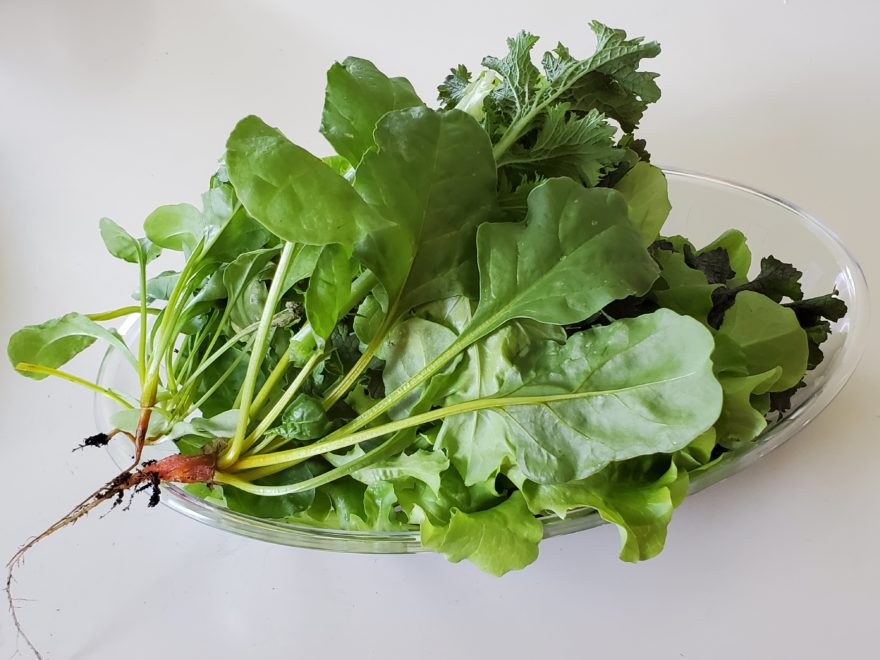First thing this morning, I walked out our front door to check on our still-new container garden for vegetables. Each time I’ve tried to set up a vegetable garden in the past, the wild rabbits roaming our neighbourhood would munch their way right through it.
In March, when I was trying to find things to do at home after all of my activities and courses were cancelled due to the pandemic, I decided to try again this year.
This year, though, would be different. I’d have a plan. First off, I’d need to find a way to keep these plants out of reach of the rabbits. To discourage these furry fiends, I thought that raised planters might work. I’ll write soon about the set-up I chose, and what I planted – stay tuned! What I’m really excited to tell you today is that my plan worked!
The lettuce plants were doing so well this morning that I realized that I’d be able to harvest some of the leaves today. At lunchtime, I went out to my little container garden, just outside our front door, and picked enough lettuce for two salads.
One for my husband, and one for me. He had the peppery leaves from the ‘spicy lettuce mix’ and I had the milder leaves from the other packet of seeds I’d purchased months ago.
We shared some beet greens as well, for our very different salads. Some of my beet seedlings had grown too close together, and I opted to let them grow a bit just for their tops.
It was a really nice feeling, to know that we’d grown the salad vegetables ourselves. It was a only a bit of fresh greens, but it also represented – in some small way – self-sufficiency and resiliency.
These two attributes are important to me, not only because of my background in healthcare (medical ethics) but also because since 2016 I’ve been a rare disease and chronic pain patient myself. Living with an often debilitating and always painful condition, I’ve become a patient advocate as well as a Patient Partner in research and other projects.
Just as I try to rise above Complex Regional Pain Syndrome (CRPS) on a daily basis – with symptoms including chronic neuropathic pain, fatigue, and a disease-related mild cognitive impairment – I’ve ‘risen above’ the marauding rabbits with these raised vegetable gardens ‘-)
This approach sums up my attitude towards CRPS; finding ways to work around it, thinking of tricks to be able to do the things that I love despite this disease. It doesn’t define me, but it does change the way I have to plan and complete tasks.
And that’s the point of this post; that when it seems that there’s no way forward, it might be time to look at the situation from another perspective. To try to find a work-around solution, or to ask for help.
I’ve had such trouble with the latter, but have learned over the past few years that having CRPS sometimes means having to ask for help. That doesn’t make me any less independent, it just means that I’m ‘working smarter’ at life.
What I wish for you, if you also have a sometimes or always debilitating medical condition, is to be comfortable with asking for help when you need it. I know that it might be easier said than done, particularly if you live alone or have caregiver responsibilities.
It might not work all the time, but remember that you can ask yourself for help, too. If you’re too tired to finish something, why not ask yourself for permission to finish it later. Does it really need to be done right this instant? Be kind to yourself.
And remember, sometimes the furry fiends don’t win. Whatever the furry fiends are, in your own life.
Thanks so much for stopping by! Stay safe, keep well, and please look out for your loved ones and your community – and yourself.

